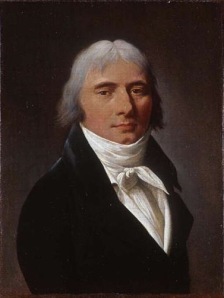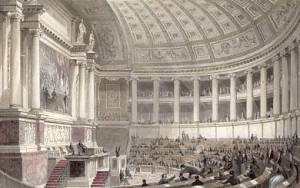 François Guizot met Pierre-Paul Royer-Collard in 1812. His name is little known today but was one of the most important during the era of constitutional monarchy, to which all his intellectual and political actions were dedicated.
François Guizot met Pierre-Paul Royer-Collard in 1812. His name is little known today but was one of the most important during the era of constitutional monarchy, to which all his intellectual and political actions were dedicated.
He was 49 years old at that time and already very experienced: a lawyer in the Paris Parliament at the end of the Ancien Régime, he participated enthusiastically in the Revolution and for a time close to Danton, was a member of the Paris Commune. Escaping from the Reign of Terror, he became a deputy in the Council of the Five Hundred in 1797, and joined the Bourbon legitimists after the coup d’Etat of Fructidor. He was then a member of the small secret council that tried to make the future Louis XVIII aware of the new situation. From 1803 onwards, he retreated into literary and philosophical meditation. In 1811, his friend Fontanes, Grand Master of the Sorbonne University, nevertheless convinced him to take up the chair of history of modern philosophy in the faculty of Arts in Paris. It was the following year that he was joined by a new colleague, twenty-four years his junior, nominated professor of modern history by the same Fontanes.
The two men were immediately drawn to one another. Both had been brought up by a revered but demanding mother and both were from bourgeois backgrounds attached to civil equality. The elder, with his traditional strict Jansenist upbringing, found in his younger colleague a certain Protestant austerity tempered by a sociable nature and an impressive capacity for work. Guizot also became very attached to his mentor, a former lawyer and a Girondin, who could be a sort of substitute father at the outset of his intellectual life. Royer-Collard had two daughters and perhaps yearned for a son, so immediately took him under his wing, instilled in him his spiritualist beliefs which resulted in his lifelong preference for Bossuet over Voltaire. He also inculcated in him a total rejection of the primacy of force over law and strength of numbers over the truth of reason. Finally, he introduced him into his philosophy circle that was also frequented by Maine de Biran and Victor Cousin, with whom he became very close.
Royer-Collard had been appointed Director of the Library and in May 1814, he imposed Guizot on the Abbé de Montesquiou, Minister of the Interior during the first Restoration, as Secretary General. This partly oriented the rest of his career. During the Hundred Days, Royer-Collard suggested to the members of the constitutional monarchist group, of which he was the leader, that Guizot should go to Ghent to counter the influence of the Ultra-royalists on the exiled Louis XVIII. This mission was to have very unfavourable consequences for the young emissary. In the “Doctrinaires” group formed at the end of 1817, Royer-Collard, then Deputy of the Marne, was looked on as the leader to the extent that, according to a tradition, the group was so named because he had formerly followed the teachings of the Fathers of Christian doctrine. Guizot was one of his close associates and together they wrote reports, speeches and drafted bills under the Richelieu and Decazes Ministries, endeavouring to provide a liberal interpretation of the Charter.
In 1820, after the assassination of the Duke de Berry and the fall of Decazes, they were both dismissed from the Council of State and consequently became sometimes virulent opponents of the regime. In January 1830, Royer-Collard was President of the Chamber of Deputies and helped Guizot to be elected in Calvados.  Viewing with displeasure the necessity of the July revolution, the Deputy of the Marne, an atypical and solitary conservative, a liberal visionary, only intervened in politics when issues concerning freedom, in particular of the press, seemed to him at stake. Such was the case in August/September 1835, when he confronted Guizot, then spokesman for the government, and in 1839 when he reproached him for his role in the famous coalition against Molé. In 1834, a personal quarrel added to their political disputes when the minister Guizot failed to obtain for the husband of one of his nieces “a considerable advancement in the high ranks of civil service”. He recounted that “a few days later, M. Royer Collard wrote me a formal letter indicating, in a few sad and bitter sentences, his wish to break off our former relations”. This was not the first time Royer-Collard had distanced himself from Guizot, as he was highly susceptible and cantankerous with a sharp tongue, and had more than once made sarcastic remarks about the ambition of a protégé who had emancipated himself too quickly and too successfully.
Viewing with displeasure the necessity of the July revolution, the Deputy of the Marne, an atypical and solitary conservative, a liberal visionary, only intervened in politics when issues concerning freedom, in particular of the press, seemed to him at stake. Such was the case in August/September 1835, when he confronted Guizot, then spokesman for the government, and in 1839 when he reproached him for his role in the famous coalition against Molé. In 1834, a personal quarrel added to their political disputes when the minister Guizot failed to obtain for the husband of one of his nieces “a considerable advancement in the high ranks of civil service”. He recounted that “a few days later, M. Royer Collard wrote me a formal letter indicating, in a few sad and bitter sentences, his wish to break off our former relations”. This was not the first time Royer-Collard had distanced himself from Guizot, as he was highly susceptible and cantankerous with a sharp tongue, and had more than once made sarcastic remarks about the ambition of a protégé who had emancipated himself too quickly and too successfully.
However, the friendship between them proved to be stronger. It was very evident during the Restoration, the period when they were closest, especially on the death of Pauline de Meulan and in 1833 when Eliza gave birth to Guillaume. It was Royer-Collard who, visiting her at that time, showed great concern and pointed out to Guizot that her fragile state could result in her death, which in fact occurred some days later. Mme Guizot senior herself had, for a long time, been an affectionate admirer of his, as he was of her.
In 1830, Guizot recruited Hippolyte Royer-Collard, his nephew, as Head of the Science department in the Ministry of the Interior, and the Guizot family frequently consulted his son-in-law, Gabriel Andral, the well-known doctor. The last exchanges between Royer-Collard, who had retired from active politics since 1839, and Guizot, then at the pinnacle of power, are imbued with a tenderness rarely expressed by Royer-Collard. He wrote in March 1844: “On reading your words, I feel that there is something indestructible between us” to which Guizot immediately replied: “I have always known and felt that between us, there was something indestructible. All my most heartfelt regards.”
On Royer-Collard’s death on September 4, 1845 Guizot wrote to his widow Augustine de Châteaubrun: “I loved him as before, as always. We separated tenderly. I will be thankful for this all my life. My mother really loved him.” He addressed this very rare homage to the Princess von Lieven: “He had a rare and delightful mind, a very noble character. Four people have had a real influence on me, on what I can be, become or do. He is one of them. The only man”. He added to his daughter Henriette: “He did far more than help me with my career. He really did contribute to my personal and inner development. He opened perspectives and taught me truths that without him, I would probably have never known.” At Val-Richer, in his little study, Guizot hung the portrait of Royer-Collard among the people he loved.